In the Shadow of Gaza: Palestinian Identity and Belonging in a Nation at War
by u/DemosthenesRex
Understanding the predicament of Palestinian citizens of Israel requires moving between singular anecdotes and the structural framework that gives them thrust and meaning. A shopkeeper’s curtailed hours, a nurse’s altered rotation, a council meeting truncated by security briefings. Each instance is readable only if situated within the broader architecture of law, land policy, and civic distribution of resources. Their legal status as citizens, while ostensibly straightforward, has been shaped by a legacy of military rule, land expropriation, and uneven civic incorporation which continues to inform the present moment. Understanding this position requires moving back and forth between the lived texture of daily life, municipal services, school enrollment, property disputes, and the larger national narrative that has long struggled to accommodate Palestinians as both part of the state and reminder of its unresolved conflicts. The reality of being a citizen is therefore neither a fixed condition nor a stable identity; it is a continuous negotiation between individual life and the state’s evolving definition of who belongs.
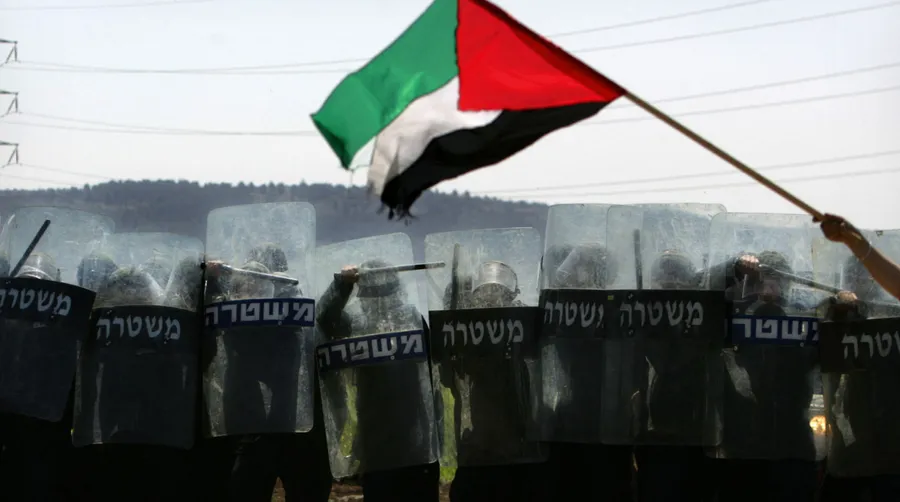
The tensions that mark this relationship emerge clearly when considering how earlier episodes of unrest and violence has shaped the public consciousness. Each incident of street violence or communal fear made sense only when placed within a wider framework of contested narratives about equality and collective memory. Yet the broader narrative itself gains clarity only through these specific episodes, which function as interpretive anchors that expose the strains within attempts at shared citizenship. The partial illuminates the whole, and the whole reshapes the meaning of each specific moment.
This interplay between detail and totality also shapes how Palestinian citizens see themselves within Israel’s current constitutional trajectory. Their demographic presence, significant yet politically constrained, feeds into national debates over identity and democratic form, while their personal experiences with bureaucracy, policing, and public rhetoric return to challenge the state’s self-presentation as both Jewish and democratic. The meaning of citizenship arises from this oscillation: the state defines the framework within which they act, yet their actions and experiences continually redefine what citizenship in Israel entails. Any attempt to understand their position must therefore trace how each experience mirrors a larger structure, and how that structure, in turn, depends on the accumulation of those experiences.
The wartime environment has produced a security posture that reaches far beyond the formal battlefield, reshaping daily realities for Palestinian citizens in ways that feel both immediate and diffuse. The activation of emergency authorities and the widening of police discretion have altered how movement, assembly, and speech are monitored, creating a landscape in which routine interactions, crossing a checkpoint, answering a knock at the door, or even posting a political remark, carry heightened risk. These measures do not exist in isolation; they interact with a national atmosphere defined by suspicion and vigilance, in which any deviation from expected civic comportment can be interpreted as a fault line in the broader struggle. As a result, Palestinians inside Israel experience the war not only through televised bombardment in Gaza but through the steady contraction of the civic space that surrounds them.
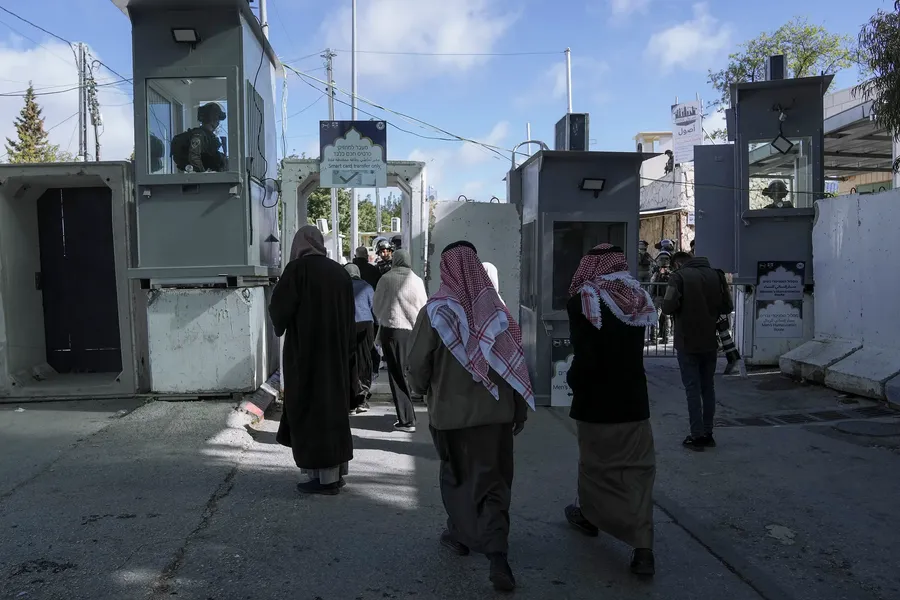
Palestinians pass through a checkpoint leading from the West Bank to Jerusalem.Photograph by Mahmoud Illean / AP
This tightening is reinforced by developments in the West Bank, where an upswing in settler attacks and a marked decline in law-enforcement response have sent a clear message about the uneven distribution of state protection. When violent incidents escalate but investigative efforts recede, the implication is that coercive actors aligned with the dominant national group operate with a wide berth, while Palestinian communities confront the conflict with little recourse to institutional redress. Although this dynamic unfolds outside Israel’s sovereign core, its reverberations penetrate inward. Palestinian citizens observe the disparity and recognize the underlying pattern, linking frontier impunity to the pressures they face within mixed cities and Arab towns.
The fusion of military stance and domestic policing becomes most apparent when national leaders employ rhetoric that ties internal loyalty to external danger. In such moments, the security doctrine governing Gaza and the West Bank leaks into the civilian sphere, shaping how police set priorities and how municipal authorities justify new mandates. Surveillance tools, crowd-control tactics, and intelligence-gathering methods originally honed in counterinsurgency contexts migrate into ordinary governance, reconfiguring the relationship between citizen and state. Palestinian citizens thus find themselves navigating a terrain in which their legal status remains intact, but the lived meaning of that status is filtered through the lens of conflict, rendering the distinction between policing and war increasingly porous.
Emergency regulations have altered the legal environment in ways that reach far beyond their stated purpose. Measures enacted under the banner of national security have narrowed the space available for civic expression among Palestinian citizens, producing a climate in which ordinary activities can be reinterpreted as subversive. Assemblies once treated as routine, public vigils, campus discussions, art exhibitions, can now be circumscribed under broad definitions of incitement or disloyalty. The cumulative effect is a form of anticipatory restraint, where individuals monitor their speech not out of persuasion but out of concern for unpredictable enforcement. This shift illustrates how states can recompute the boundaries of permissible conduct when confronted with external conflict, transforming temporary regulations into instruments that shape everyday behavior.
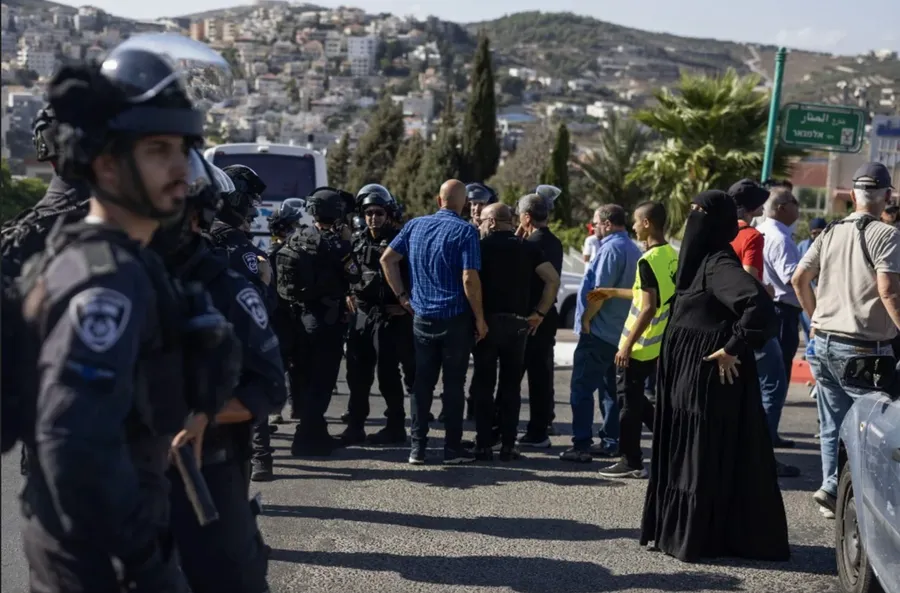
Israeli policemen disperse a rally by Palestinian citizens of Israel and left-wing activists to protest the war in Gaza and Lebanon, in the northern Arab town of Umm al-Fahm, on 3 August 2024 (Oren Ziv/AFP)
Institutions that traditionally cultivate open inquiry have not been insulated from these pressures. Universities, hospitals, and NGOs have adopted internal protocols designed to minimize reputational risk, often at the expense of those who rely on these institutions for professional advancement or a sense of communal belonging. Administrators, seeking to avoid political scrutiny, may initiate disciplinary hearings, suspend student groups, or restrict public statements, all under the rationale of preserving neutrality. Yet neutrality itself becomes a contested space, as silence in the face of violence is interpreted as complicity by some and prudence by others. The result is a form of institutionalized caution that reshapes the intellectual and interpersonal life of these environments.
Within this atmosphere, the lived experience of Palestinian citizens becomes defined less by explicit prohibitions than by diffuse signals of surveillance and scrutiny. A social worker who speaks Arabic at a hospital ward, a lecturer who assigns a text on colonialism, or a municipal worker who shares a private message of mourning for relatives in Gaza may find themselves drawn into disciplinary processes that appear disproportionate to the acts in question. These episodes do not follow a single pattern, rather they accumulate as a series of moments in which the line between permissible expression and punishable deviation becomes opaque. The indeterminacy of enforcement magnifies its impact, encouraging individuals to anticipate institutional penalties long before any official action occurs.
What emerges from these conditions is a social environment in which formal equality coexists uneasily with practical vulnerability. The legal architecture of citizenship, rights to speech, assembly, and political participation, remains intact on paper but becomes conditional in practice. The tension between statutory guarantees and experiential reality reflects a deeper paradox. The more the state invokes security, the more it redefines the civic identity of those it already regards with suspicion. This is not simply a contraction of liberty, it is a recalibration of belonging, executed through mundane procedures that alter the rhythm of daily life.
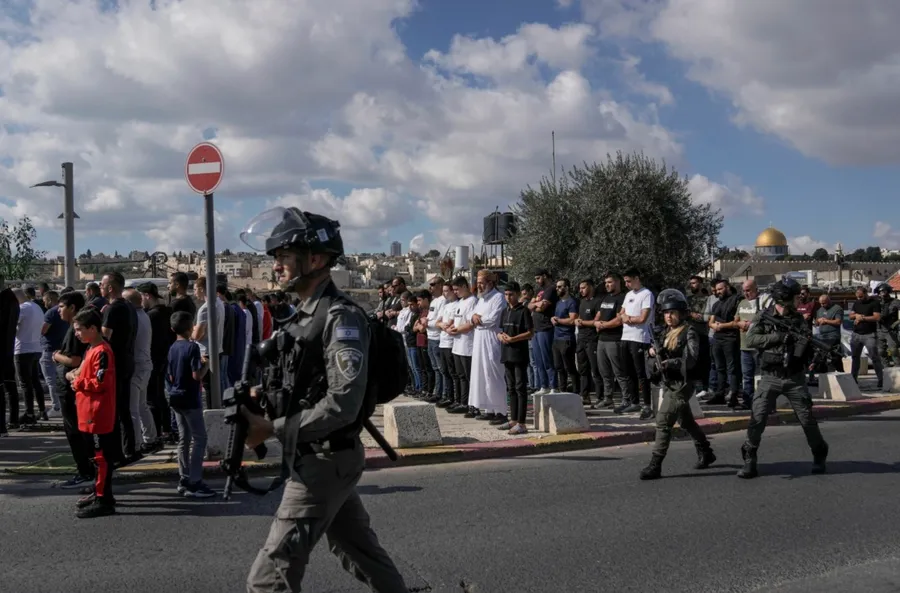
Palestinian Muslim worshipers who were prevented from entering the Al-Aqsa Mosque pray outside Jerusalem’s Old City as Israeli forces stand guard on Nov. 17, 2023. (Mahmoud Illean/AP)
Wartime rhetoric in Israel often transforms the question of loyalty from a dormant anxiety into a daily test, and Palestinian citizens find themselves evaluated through a lens sharpened by conflict. The shift is rarely declared outright; instead, it appears in the quiet recalibration of social interactions, conversations that cut short, invitations that evaporate, and community spaces that once felt shared but now seem provisional. These moments accumulate into a pervasive sense of conditional belonging, where identity is not simply lived but inspected, and where the boundaries of civic membership tighten in response to national fear. What emerges is a brittle social terrain in which citizens who have long negotiated hybrid identities must now navigate suspicion that is ambient rather than overt, yet no less consequential.
This tightening of social boundaries is mirrored in the municipal and institutional sphere, where wartime security concerns bleed into administrative judgments and policing norms. Local councils adopt rules that while framed as public-safety measures, alter public space in ways that disproportionately affect Arab neighborhoods, schools, and businesses. Police patrol patterns shift, not always through explicit directives but through a kind of intuitive governance shaped by anxiety, precedent, and political cues from above. In mixed cities, the adjustment carries a double weight. Jewish residents often perceive heightened threat, while Palestinian citizens sense a form of oversight that exceeds routine law enforcement and begins to resemble a test of acquiescence. These shifts are subtle enough to evade formal scrutiny but potent enough to reshape everyday life.
The climate has generated a dual movement within the political life of Palestinian citizens of Israel. On one side, intensified state scrutiny and heightened public suspicion have narrowed the space in which established Arab parties operate, limiting their ability to influence decisions that directly shape their communities. On the other side, the erosion of conventional channels has created an opening for new forms of civic engagement, often driven by younger Palestinians who no longer expect meaningful inclusion in national institutions and instead seek to build parallel forms of representation. Their efforts, though uneven, reflect a search for political voice in an environment where formal structures remain resistant or unresponsive.
At the same time, the language used by Palestinian leaders is shifting in ways that signal a deeper reorientation. While earlier generations tended to frame their demands within the lexicon of equal citizenship and civil rights, the present moment has pushed many toward a rhetoric that draws more explicitly on collective identity and national belonging. This shift does not arise from abstract theorizing but from lived encounters with policing, targeted surveillance, and recurrent exclusions from crisis decision-making. The move from civic to national framing reflects a growing belief that equality cannot be secured solely through appeals to state law, but requires a renegotiation of the fundamental relationship between Palestinian citizens and the Israeli state.
This transformation places Palestinian citizens at a crossroads. They must decide whether political influence is best pursued through existing institutions, fraught as they may be, or through alternative pathways that bypass the state’s official arenas. Each route carries risks. Institutional engagement may reinforce structures that limit their agency, while extra parliamentary activism may provoke further repression or isolation. Yet these dilemmas also carry the possibility of renewal, as communities reassess what forms of leadership, solidarity, and strategy can withstand wartime pressures and chart a viable course for the future. In this sense, wartime politics functions not only as a moment of constraint but as a crucible in which new political identities and ambitions are forged.
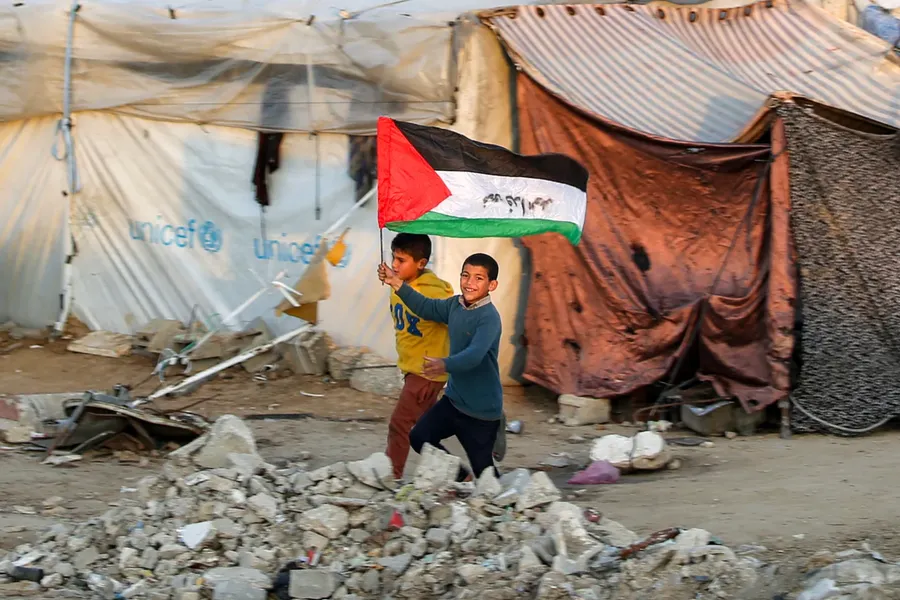
A boy, holding a Palestinian flag inscribed with the Arabic phrase "we sacrifice ourselves for the nation," runs past tents at a camp for people displaced by conflict in Bureij on Jan. 17.
Eyad Baba/AFP via Getty Images
The devastation in Gaza reverberates with particular intensity among Palestinian citizens of Israel, who carry a dual consciousness that binds them to the unfolding catastrophe while situating them within the civic framework of the state prosecuting the war. The images of collapsed towers, mass displacement, and unrestrained bombardment acquire a symbolic power that shapes how many Palestinian citizens interpret their own position inside Israel, neither fully insulated from the violence nor fully authorized to voice grief or outrage. This internalized vigilance, however, does not eliminate forms of solidarity, improvisation, or muted dissent.
The exclusion of Palestinian citizens from the core arenas of governance highlights a persistent structural pattern within Israel’s political architecture. Security councils, emergency committees, and crisis-management forums operate without meaningful Arab participation, even though their decisions shape the civil, legal, and social conditions under which these citizens live. This institutional absence is not merely procedural but reveals a deeper constitutional trajectory in which sovereignty and representation drift further apart. Wartime decisions become long-term precedents, embedding hierarchies of membership and voice that narrow the possibilities for inclusive democratic practice. In this way, the crisis does not suspend normal politics but accelerates existing tendencies toward centralized power and diminished pluralism.
This concentration of authority creates a secondary effect. Wartime policies begin to define the contours of political identity. When civic representatives are removed from deliberation, the categories through which the state recognizes political actors become sharper and more rigid. Palestinian citizens must therefore navigate a political field in which their capacity to influence state policy is increasingly constrained, even as the policies in question intrude more deeply into their daily routines. The constitutional stakes are amplified by the uncertainty surrounding emergency powers, tools that can be extended, reinterpreted, or absorbed into ordinary governance. The result is a civic environment in which the boundary between temporary necessity and permanent structure becomes difficult to distinguish.
Amid this turbulence, the question of future political pathways for Palestinian citizens becomes increasingly complex. Some see new opportunities in municipal activism, legal advocacy, and cross-communal organizing. Others believe that the contraction of parliamentary influence forecloses any prospect of meaningful reform within existing frameworks. The war has sharpened debates over whether political strategy should remain oriented toward civic equality within the Israeli system or shift toward more pronounced national claims that foreground decolonization and collective self-determination. These debates are not abstract. They shape organizational alliances, legal tactics, and the language leaders use to articulate grievances or aspirations. They also influence how younger generations interpret their own position within the state.
Looking ahead, several trajectories remain plausible, none preordained. One is a gradual entrenchment of dual systems of governance and citizenship, justified through prolonged emergency logic. Another is the emergence of parallel civil societies, Jewish and Palestinian, each developing its own strategies for protection and influence, with minimal overlap. Yet there is also the possibility of a renewed civic framework built from local initiatives, shared economic interests, and pragmatic necessity. The direction Israel takes will depend not only on formal constitutional choices but also on how individuals and communities respond to the pressures and openings created in the present moment. In this sense, the future of Jewish-Arab relations inside Israel remains suspended between possibilities, shaped as much by lived experience as by legal design.